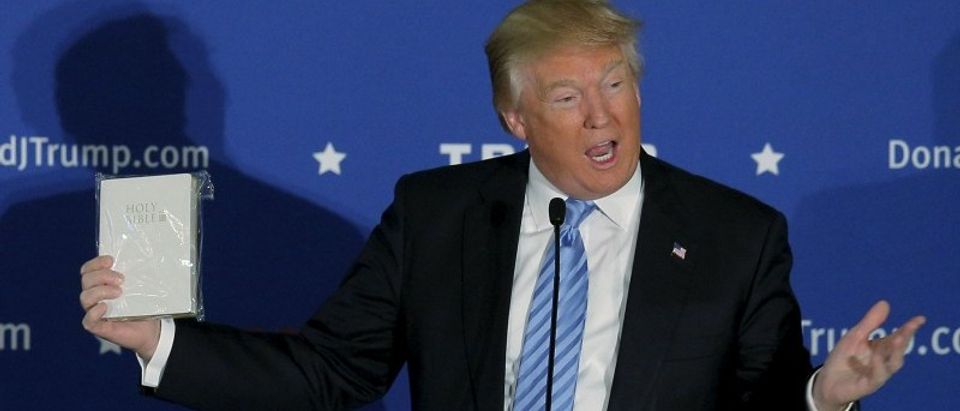Twelve years ago, PBS put out a Frontline special on then-President George W. Bush’s ties to the evangelical community.
The feature shows the religious right in a triumphant mood with one of their own in the White House and taking an influential role in shaping the president’s policy agenda. A partial-abortion ban, government funding for faith-based initiatives and a proposed amendment outlawing same-sex marriage are all things Bush pushed forward on behalf of his social conservative base.
“In this administration, they call us, and they say, ‘What is your take on this? How does your group feel about this?'” Richard Land, then-president of the Southern Baptist Convention’s public policy arm, told PBS at the time. “I don’t know if there’s any question that this administration understands that Southern Baptists and other evangelicals are a very significant part of their coalition. By some estimates, 40 percent of their raw vote came from evangelicals.”
The 2004 documentary paints a picture of the evangelical community as an inescapable force within the Republican Party, one that any future GOP presidential candidate must earn their favor in order to secure the nomination.
Fast forward today, and Donald J. Trump is the presumptive Republican nominee — much to the dismay of Bush’s fervent evangelical allies. While Trump has made a strong effort at appealing to evangelicals in the primary and has won a few endorsements from leaders of the movement, his campaign has drawn unprecedented opposition from the majority of those on the religious right. Some of that opposition is due to Trump’s prior support for abortion and other socially liberal causes.
As Land remarked in 2004, evangelicals liked Bush because he had a “settled faith conviction” that abortion was evil. No one on Earth is going to claim Trump has a settled faith conviction on the issue of abortion. Which brings up the problem of evangelicals not believing The Donald has much of a Christian faith.
Trump rarely mentions the Bible outside of saying “nothing beats it.” He once famously referred to a passage in Corinthians as Two Corinthians. Last summer, he told a gathering of evangelicals he implied he doesn’t seek forgiveness from God.
Additionally, Trump’s long history of womanizing, involvement in the casino industry and “demagogic” rhetoric make evangelicals decry the candidate’s character.
With Trump in the driver’s seat all the way to the Republican Convention, the religious conservatives who’ve advised and fervently championed GOP candidates in the past are appearing to break away from the party they’ve called home for 40 years.
The foremost evangelical critic of Trump is Land’s successor at the Southern Baptist Convention, Russell Moore. Over the last year, the Southern Baptist leader has derided the flamboyant businessman for supposedly stoking the fires of racism and being an affront to Christian values. Moore’s latest column, published by The New York Times, warned his followers that a vote for Trump may even put your soul at risk of damnation.
That sentiment, shared by many other social conservatives, is what’s driving the leaders of this large Republican constituency to beg for someone, anyone to launch a third party challenge against the likely Republican nominee.
The situation is a far cry from the days when Bush advisers could boast they could win elections with the overwhelming support of evangelicals alone. Now Trump appears to be attempting to win a general election without the majority of their leaders’ support. Note the key word: leaders.
Among the average voters who describe themselves as evangelicals, Trump has done pretty well for an alleged pagan. Trump still won a plurality of religious conservatives in the primary even with all the condemnations and the presence of [crscore]Ted Cruz[/crscore], a candidate who built his entire campaign around evangelicals. However, the evangelicals who voted for Trump were primarily the ones who rarely attended church; those who attended often were less likely to cast a ballot for The Donald.
In the years since Bush won re-election with the help of evangelicals, America has become a less religious country, in large part due to millennials. It’s also a country which now recognizes gay marriage in all 50 states and is increasingly trying to make transgender-bathrooms a universal requirement.
Social conservatives are in a weak position right now, and it may be tempting to depart over Trump’s nomination. However, that will only mean things will get worse for evangelicals when it comes to policy. A Republican Party without social conservatives could allow the GOP to adopt liberal positions on a variety of issues, such as abortion. The Democrats will continue being the liberal party of choice and consider evangelicals the devil.
Their new third party would base itself on a movement in decline and would have trouble attracting voters outside of its persuasion. Moreover, it would likely die quickly and Republicans wouldn’t be too pleased to welcome back with open arms a group that left the party at a crucial moment. Like the Progressives who bolted the Republican Party in the early 20th century, social conservatives would be a movement without a party and without access to influence policy.
However much Trump may be offensive to evangelical leaders, he is still the only major party candidate who takes a pro-life stance and is willing to take the advice of religious conservatives. Hillary Clinton certainly won’t be a friend to social conservatives, and it’s worth noting that the last Republican presidential nominee had a history of taking social liberal policies before running in the party primaries. There wasn’t a #NeverRomney movement in 2012 though.
If evangelicals don’t want to vote for Trump, no one is going to force them to and there’s ways for them to stay in the GOP without having to. But to abandon the party is to abandon their political relevancy.


